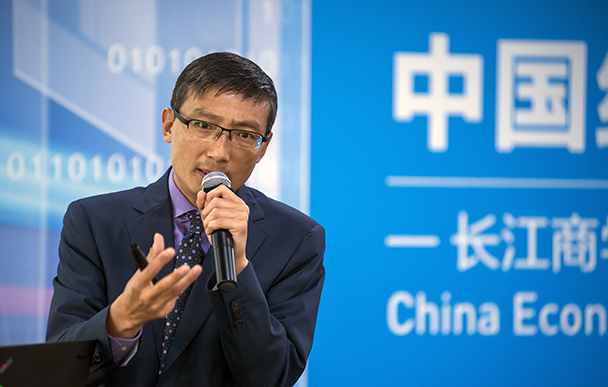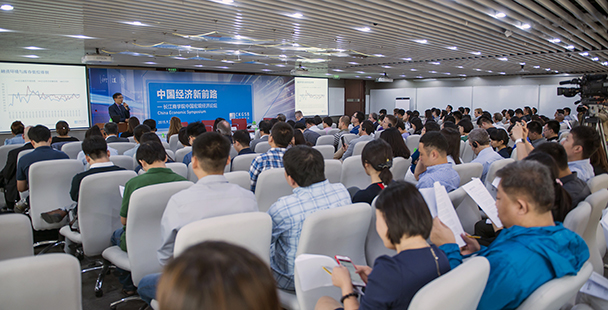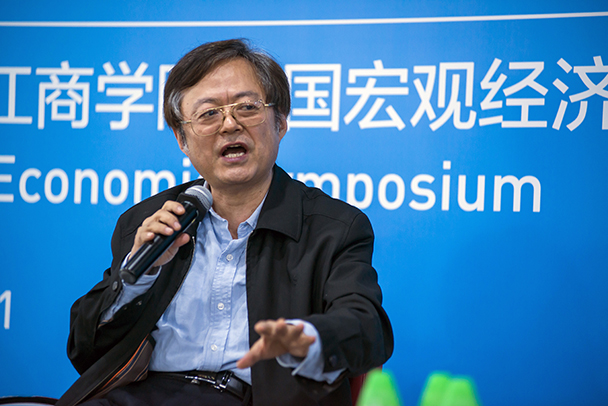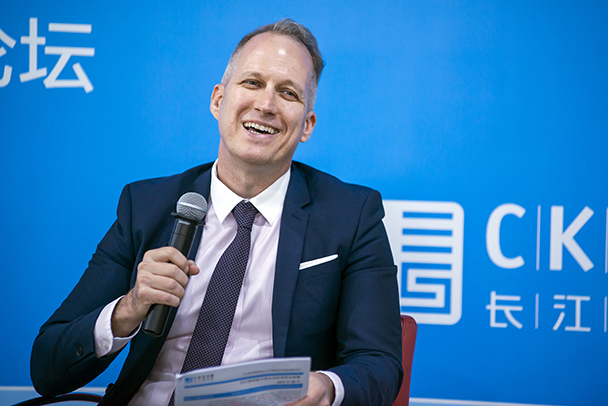With China sliding into its slowest annual expansion in 24 years, the country’s growth is being scrutinized around the world. With the significant drop of the RMB against the US dollar, the equity market bubble and rising debt levels, doubts and anxiety are rising around China’s economic development and its implications globally. How do Chinese firms and business leaders view the country’s economic situation? Are they positive about the prospects ahead? Do multinational companies share their sentiment? These were just some of the questions discussed at an exciting event in Beijing on Monday at the Cheung Kong Graduate School of Business (CKGSB).

Li Wei, Professor of Economics at CKGSB, gives a keynote speech at CKGSB’s Beijing campus on September 21, 2015.
Drawing on his Business Confidence Index (BCI)—a unique index launched in 2011 that measures the business sentiment of Chinese executives about China’s macro-economic environment—CKGSB Professor Li Wei highlighted some of the report’s findings, while also analyzing the underlying reasons behind the current situation.
Prof Li said that while the corporate situation is still pretty good, because the BCI has generally remained above the threshold of 50, profitability has been decreasing, since companies have been unable to pass rising costs downstream. He also expressed concern that entrepreneurs might have the wrong outlook for the economy, which he said could be disastrous since they might still be borrowing money and could get stuck in a hole if the economy goes against them. If you don’t spend, Prof Li said, you will lag behind when the downturn is over, so that is why many companies keep spending even when times are tough.

A packed room takes notes during CKGSB Professor Li Wei’s keynote speech.
Professor Li Wei stated the need for refinancing, while also laying out some necessary reform steps, including ending land monopolies by local government and continuing the anti-corruption campaign and crackdown on interest groups. Lastly, he expressed the hope for a more streamlined government and continued entrepreneurship to pick up the slack caused by aging SOEs.
A lively panel discussion, moderated by Li Xin, Managing Editor of Wall Street Journal Chinese, followed, with experts in China’s economy sharing their considered views.
.jpg)
Panel (from L to R): Li Wei, Professor of Economics, CKGSB; Wei Jianing, Deputy Director-General, Macroeconomic Research Dept, Development Research Center of the State Council (DRC); Rob Koepp, Beijing Director, Economist Corporate Network; Li Xin, Managing Editor, Wall Street Journal Chinese
Wei Jianing, Deputy Director-General of the Macroeconomic Research Dept at the Development Research Center of the State Council (DRC), expressed the need to view China’s economy from three different perspectives—a long-term view, a mid-term view and a short-term view. He added that he supported the crackdown efforts, even though it has harmed the economy. The only solution, he said, is to expedite the reform steps and seek to boost consumption.
Professor Li Wei talked about the large gap between Chinese and western institutions, though he said that gap was closing. To emphasize the point, Rob Koepp, the Beijing Director of the Economist Corporate Network, said that Exxon Mobile is roughly twice as profitable as China Petroleum, but has only about one-eighth of the number of employees, showing how inefficient SOEs can be. Wei Jianing said that private public partnerships (PPP) are a very good initiative to promote government reforms. He highlighted healthcare, education and environmental protection as all areas that need urgent attention, with Koepp saying the fact that so many Chinese parents want their children to study overseas underscores the deficiencies in the Chinese education system.

Wei Jianing, Deputy Director-General of the Macroeconomic Research Dept at the Development Research Center of the State Council, answers a question during the panel discussion.
Li Xin then asked the panel why costs, which used to be China’s economic advantage, have become so high. Professor Li Wei replied that higher costs are bad for shareholders, but good for employees, so from a macro level, the situation is neutral, but from a long-term perspective, more value has been created, which benefits China. He added that high costs are a pain point for companies as they try to make transitions, but since China is trying to move to a more western model, this is an essential step and no shortcuts can be taken.
Wei Jianing used some medical metaphors to describe the ways of dealing with China’s economy: “blood transfusion”, “surgical operation” and “stop the bleeding”, adding that giving China an “anesthetic” is a new school of thought. But he said that simply relying on the blood transfusion method is not enough, and that the bleeding must first be stopped. Koepp shared the example of Japan, a very developed economy, even though it had two lost decades. He pointed out that while China’s economy only surpassed Japan’s economy in 2010 with $6 trillion GDP, it is now already at $10 trillion GDP, showing the rapid growth that has been experienced in recent years.

Rob Koepp, Beijing Director of the Economist Corporate Network, lightens the mood during a discussion on the state of China’s economy.
Other issues discussed were the renminbi, the reform of export-orientated companies and land reform. Koepp said that it is inevitable that the renminbi will continue to appreciate in the next 1-2 years, but not as much as it has done this year. But he pointed out that Apple and other large multinationals do not care about foreign exchange fluctuations because they work in all markets, saying China needs more global brands so that the exchange rate is no longer an issue.
Professor Li talked of the need to introduce a property tax, which would combine the fiscal interests of local governments while also providing services to the public. Wei Jianing lamented that if a property tax had been introduced ten years, perhaps the current problem would not now exist, but he said the timing of when to bring in the tax is crucial. In addition, he said that there are great differences in regions across China, so there is no one solution that can applied equally to all provinces.
.jpg)
Senior executives, members of the media and other professionals attended the fascinating discussion.
The session continued with some questions from the audience, before Li Xin asked the panelists for a final piece of advice for the Xi administration. Professor Li Wei said that the anti-corruption campaign is good, but stressed the need for a smaller government; Wei Jianing said he was concerned about the implementation of reform, but said he hoped that the US and China could reach consensus on global reforms; and Koepp ended the session by saying that China, while remembering history, should not see other countries as enemies. He added that the opportunity exists to create win-win situations, but said that if China views other countries as competitors, it might miss these opportunities.